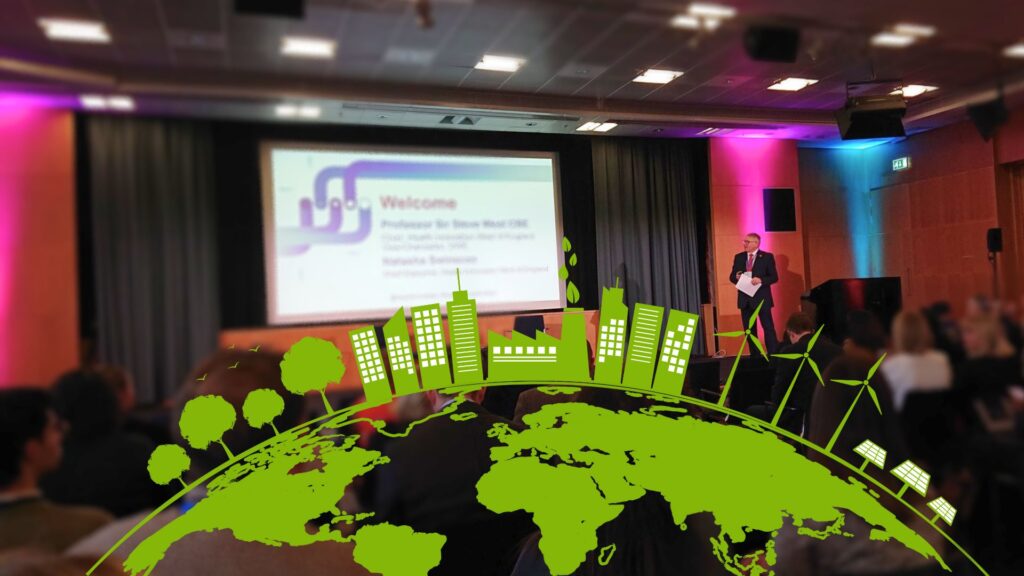The event industry is traditionally very heavy on single use items. Carpet that gets installed for a 5 day show then scrapped. A car track created for an 8 minute new product launch, then scrapped. Venues have seen it all. The whole industry can have significant environmental, social, and economic impacts on the communities in which their events are held. So what is the event industry doing about sustainability?
Critical issues
It is essential the event industry takes action around sustainability because:
- The Environmental impact: Events can generate a significant amount of waste and contribute to pollution and climate change. By incorporating sustainability practices, event producers can reduce waste, conserve resources, and lower their carbon footprint.
- Social impact: Events can bring people together for meaningful connection and have a positive impact on the community. By incorporating sustainable practices, event producers can support local businesses, promote community engagement, and create a more inclusive and accessible event experience.
- Economic impact: Sustainable events can be cost-effective and help event producers to save money in the long term. Additionally, events that incorporate sustainable practices can attract more attendees and sponsors who prioritise sustainability.
Improving sustainability in events improves positive outcomes for the industry, venues and the communities in which we host our events.
Read our article on why carbon neutral events are important.
Keeping the event industry accountable
The event industry is largely self-regulated, which means that it is up to us as event organisers, alongside our sponsors, and attendees to hold ourselves accountable for sustainable practices.
How can accountability be established and maintained within the industry?
- Industry standards and guidelines: There are various industry standards and guidelines that event organisers can follow to ensure sustainable practices. For example, the International Standard for Sustainable event management (ISO 20121) provides a framework for sustainable event management, and the Global Reporting Initiative (GRI) offers guidelines for reporting on sustainability.
- Certification programs: Several organisations offer certification programs for sustainable events, such as the Council for Responsible Sport and the Events Industry Council’s Sustainable Event Professional Certification. These programs provide a way for event organisers to demonstrate their commitment to sustainability and receive recognition for their efforts.
- Peer pressure and collaboration: Event organisers can hold each other accountable by sharing best practices and collaborating on sustainability initiatives. Industry associations, such as the International Live Events Association and the Sustainable Event Alliance, provide a platform for collaboration and knowledge-sharing.
- Attendee feedback: Attendees can provide valuable feedback on sustainability practices at events, which can help event organisers to identify areas for improvement and make changes accordingly.
Does the events industry need a regulatory body?
Without a regulatory body for the event industry we have learnt that many of the leading event agencies and leaders gathered together to form ISLA. The responsibility is on us, the events industry to fix this. Events don’t need to be so wasteful.
ISLA is here to accelerate the event industry transition to a sustainable future. They work with agencies and brands, organisers and suppliers, providing practical guidance and support on environmental issues, drawing on expertise from across the sector to create a powerful network, with the knowledge and confidence to facilitate change.
They focus on three key areas: zero waste, 100% renewable, and carbon emission reductions.
There is training, working groups and measurement software to start the journey towards net zero – Driving down industry emissions through annual reporting and targets.
By using the ISLA framework, you can demonstrate your commitment to sustainable event management practices, conduct sustainability assessments, develop and implement a plan, and evaluate and report on your sustainability performance. All of this provides assurance to stakeholders that your event is socially, economically, and environmentally responsible.
You have to be a member to access most of the training and benefits, but ISLA offer ‘Proseed’ for free, which is a universal framework that simplifies sustainability. It is full of information, guidance, solutions and actions event industry partners can action to accelerate the sustainability journey.
Join as a member if you are in the events industry.
Take it further and check out becoming a Bcorp.




